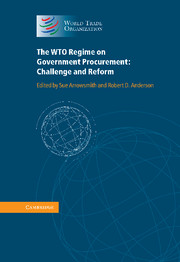Book contents
- Frontmatter
- Contents
- List of contributors
- Foreword by Pascal Lamy
- Perspective of the Chairman of the WTO Committee on Government Procurement, Nicholas Niggli (Switzerland)
- Preface
- Disclaimer
- PART I The WTO regime on government procurement
- PART II Expanding the scope of the Agreement on Government Procurement: accession and coverage
- PART III Revision of the procedural rules and other transparency provisions of the Agreement on Government Procurement
- PART IV Developing countries in the WTO procurement regime
- PART V Economic and social development (horizontal policies) in government procurement
- PART VI Enforcement and remedies
- PART VII Multilateralism and regionalism
- PART VIII Challenges and new directions
- 22 Ensuring integrity and competition in public procurement markets: a dual challenge for good governance
- 23 Developing multilateral rules on government procurement: the value of soft law
- 24 Work of UNCITRAL on government procurement: purpose, objectives and complementarity with the work of the WTO
- 25 Global procurement law in times of crisis: new Buy American policies and options in the WTO legal system
- 26 Procurement in times of crisis: lessons from US government procurement in three episodes of ‘crisis’ in the twenty-first century
- Index
25 - Global procurement law in times of crisis: new Buy American policies and options in the WTO legal system
from PART VIII - Challenges and new directions
Published online by Cambridge University Press: 07 September 2011
- Frontmatter
- Contents
- List of contributors
- Foreword by Pascal Lamy
- Perspective of the Chairman of the WTO Committee on Government Procurement, Nicholas Niggli (Switzerland)
- Preface
- Disclaimer
- PART I The WTO regime on government procurement
- PART II Expanding the scope of the Agreement on Government Procurement: accession and coverage
- PART III Revision of the procedural rules and other transparency provisions of the Agreement on Government Procurement
- PART IV Developing countries in the WTO procurement regime
- PART V Economic and social development (horizontal policies) in government procurement
- PART VI Enforcement and remedies
- PART VII Multilateralism and regionalism
- PART VIII Challenges and new directions
- 22 Ensuring integrity and competition in public procurement markets: a dual challenge for good governance
- 23 Developing multilateral rules on government procurement: the value of soft law
- 24 Work of UNCITRAL on government procurement: purpose, objectives and complementarity with the work of the WTO
- 25 Global procurement law in times of crisis: new Buy American policies and options in the WTO legal system
- 26 Procurement in times of crisis: lessons from US government procurement in three episodes of ‘crisis’ in the twenty-first century
- Index
Summary
Introduction
What should governments do to protect their citizens in a global economic crisis? National economies are interdependent and economic risk is systemic on a global scale, but economic policy remains pervasively national in scope. Fiscal policy is one tool that some economists advocate to counteract economic downturns. Fiscal policy, however, has not been the subject of collective action at the global level, and if it has, states accomplish it in ad hoc political (as opposed to legal) arrangements in response to particular crises. More generally, states retain primary responsibilities for structuring institutions to promote economic justice for their citizens. Despite moves towards conceptualizing justice as a global concern, justice remains primarily a concern for domestic constitutional orders. Fiscal policy and economic justice are widely understood as the domain of the political orders of states, national in their reach, tied to notions of statehood. These features of the state are in tension with the increasingly complex interdependencies of states and with the dense web of treaty commitments they have undertaken, particularly in economic matters.
To put this tension in more concrete terms, consider the expenditure of approximately US $181.7 billion in today's dollars by the US government's Works Progress Administration (WPA) in the mid-1930s, intended to stimulate the US economy during the Great Depression. In the 1930s, efficiencies associated with contracting out by government were not well understood. The WPA engaged in direct government provision of construction and other services. It employed up to 3.3 million in 1938.
- Type
- Chapter
- Information
- The WTO Regime on Government ProcurementChallenge and Reform, pp. 773 - 802Publisher: Cambridge University PressPrint publication year: 2011
- 2
- Cited by

